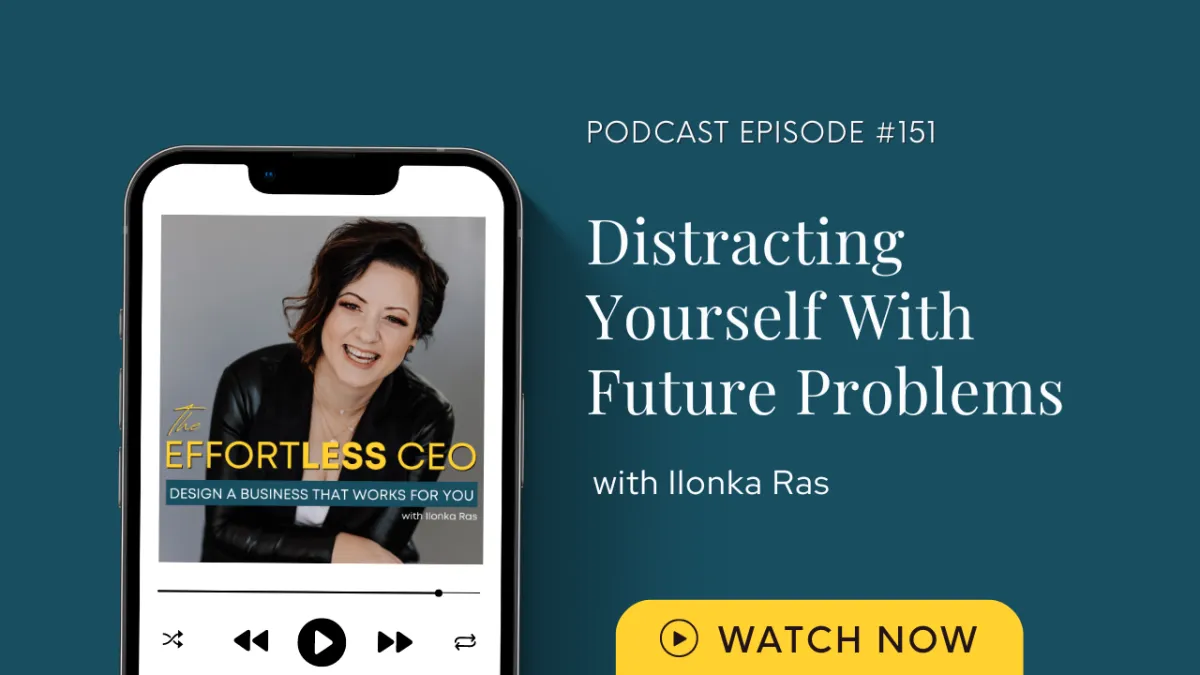
The EffortLESS CEO Podcast
Your weekly dose of actionable strategies for working less and living more.
The EffortLESS CEO Podcast
Your weekly dose of actionable strategies for working less and living more.

Grab your earphones and join me in conversation...

Distracting Yourself With Future Problems
Did you know you can also watch this episode on YouTube?
Distractions are everywhere, and those distractions can sometimes disguise themselves as activities that look and feel productive but that are actually slowing us down and keeping us from achieving our goals.
I define distractions as anything that takes us away from what matters.
The beauty in this is that YOU get to define what matters to you. Which also means only you can really say what a distraction is for you.
One of my favourite quotes by Nir Eyal is:
"In order to call something a distraction, you need to know what it’s distracting you from."
Coaching my clients, there is one type of distraction that comes up a lot and I want to share my thoughts on it and how you can avoid this in your own business so you can stay focused on your goals.
The Subtle Distraction of Future Problems
One of the most common ways we distract ourselves is by trying to solve future problems before addressing the challenges we face right now. This kind of distraction is tricky because it feels like we’re still making progress toward our goal - and although we still have the goal in our sights, we’re not actually focusing on the next best action that will get us there. We’re focused on a future action step, instead of the most important NEXT step.
The problem with this is that the future step we think we are going to need to take will probably change, because as we take action, we get feedback. We get clarity by taking action. And more often than not, the plan we had in the beginning isn’t always the exact same plan we ended up following in the end. And it’s because we may need to make some adjustments along the way. If we’re focused in future actions instead of actually doing the next best steps right now, we won’t get that valuable feedback.
This means, we’re spending a lot of time thinking about things and perhaps even taking action but we’ve skipped a few very important steps. And this will delay progress.
Let me give you a few examples of what this might look like:
Example 1:
Goal: Writing your first book
Distraction: Researching how to market the book when you haven’t written chapter 1 yet.
Example 2:
Goal: Introducing a new service in your business
Distraction: Investing in tools for scaling when you haven’t validated the offer yet.
Example 3:
Goal: Launching a podcast
Distraction: Focusing on getting sponsors before you’ve even recorded your first few episodes.
Why We Get Distracted
So why do we do this? There are a few key reasons:
Fear of not being in control:
We want to be prepared for every possible scenario, which makes it harder to focus on the now. We want to see the whole staircase. We want certainty that things will pan out the way we planned.The Illusion of Progress:
Also called Productivity Masking - we feel like we’re productive. But it’s actually a form of procrastination. This can keep us in cycles of busy work and not really moving the needle on the goals we have set for ourselves.The Brain’s Safety Mechanism:
We’re afraid to take the immediate action because it takes us out of our comfort zone. It’s easier to focus on something that’s distant and in the future than it is to take the action we need to take now. Our brains are wired to avoid discomfort, seek pleasure (usually in the form of instant gratification) and to conserve energy. And if we want to achieve big goals and make our business a success…then we’re going to have to get uncomfortable, delay gratification, and take massive action. Everything your brain does not want to do.
How to Stay Focused on the Next Step
How do we avoid these distractions and stay on track?
Set Clear, Short-Term Goals:
Make sure you’re clear on what the goal is. I like having a long-term goal, a three-year plan, and a short-term 90-day goal that aligns with that three-year plan.Identify Your Current Priority:
What is the one thing you should focus on that will move you closer to your goal? Research shows that multitasking can reduce productivity by up to 40% . Focusing on one thing at a time ensures better progress.Awareness: Noticing when you are distracting yourself. Being very honest with yourself and checking in regularly. Noticing when you’re avoiding discomfort. When your brain is offering you something else that feels like more fun or something more important in the moment. The more you build awareness and then gently bring yourself back, the faster you will catch yourself and get yourself back on track.
Weekly Planning:
Plan your week instead of going day by day. When we plan for the week in advance, we can be more intentional rather than risking impulsive decisions that can take us away from what matters most.Accountability:
Find an accountability partner or system to help stay on track. According to studies, having an accountability partner can increase your chances of success by 65% . If you share regular updates with that partner, your success rate goes up to 95%.
Actionable Takeaway
I want to leave you with one key question to ask yourself each day:
"What is the most important next step that will get me to the goal?"
It’s easy to get distracted. It’s easy to keep ourselves busy with a hundred things. But we will move much faster when we focus on one thing at a time.
If you would like me to com alongside you and help keep you accountable on your way to your goals, book a consultation, and let’s discuss how we can work together.
If you found this helpful. Share it with a friend in business and let’s help each other grow.
Did you miss last week's episode? - Catch up HERE
If you found value from the podcast, subscribe so you never miss out on a new episode!
Leave us a positive review here and help us reach and help more business owners.
ilonkaras.com | Ilonka Ras Coaching Pty Ltd
All Rights Reserved

